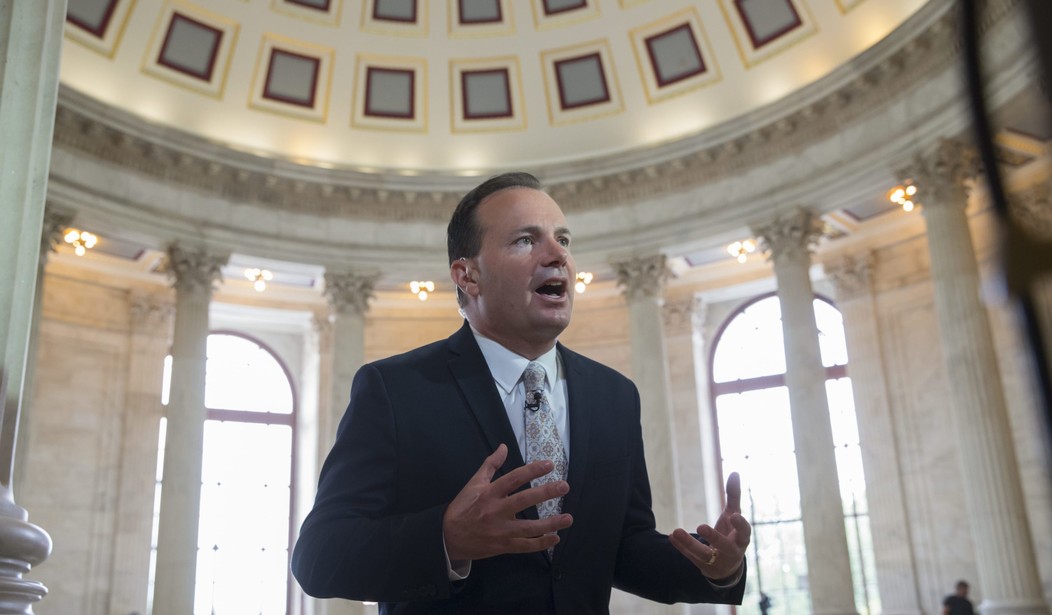WASHINGTON – Sen. Mike Lee (R-Utah) said Congress should take authority over trade tariffs away from the executive branch, arguing that the president and federal bureaucrats have “excessive power” over trade policy.
President Trump recently announced his attention to implement a 25 percent tariff on steel imports and a 10 percent tariff on aluminum imports.
“There are grave dangers in a trade war just as there are dangers of a different kind in a regular war,” Lee said during a recent online town hall with constituents. “It’s one of the reasons we need Congress to reclaim this authority and we need Congress to recognize that there are a lot of problems that can result from this kind of delegation of power to the president.”
Lee said he is actively encouraging Trump to abandon the steel tariff. The White House said the policy would be released late this week.
“The president is currently being advised by some people to impose tariffs under Section 232 of the trade act on imported steel and aluminum,” Lee said, referring to the national security provision. “I’ve had multiple conversations over the last few weeks with the president about this, advising him in the strongest possible terms not to take this action because, as I pointed out to him, although there are some jobs in America that might be protected by such an action, there are a whole lot more jobs that would be put on the line.”
“There are a whole lot more jobs dependent on sectors of the manufacturing industry that rely on steel and aluminum as a fungible commodity including imported steel and aluminum,” he added. “There are a lot of jobs that would effectively be outsourced as a result of such action, so I hope he doesn’t take that.”
Trump and other Republicans have called for Senate Majority Leader Mitch McConnell (R-Ky.) to use the nuclear option for legislation as a way to move the GOP agenda forward. Lee said he opposes changing the Senate rules for the passage of legislation.
“Closing debate often requires cloture – cloture takes 60 votes or three-fifths of the Senate. There are those who have suggested we should break the rules of the Senate in order to get around this; in other words, to have a simple majority to say we don’t need cloture and to overrule the simple minority with a simple up-or-down vote. There are a lot of good arguments behind that,” Lee said.
“One of the reasons I don’t support that is because I don’t think it’s necessary. There are a lot of things the 60-vote cloture standard has protected over time. It has protected the mission creep of the federal government from becoming even more advanced and even more accelerated, and I fear that we would lose something – we would lose some of the free and open debate that has been protected over the decades by the 60-vote cloture standard,” he added.
Lee argued that the existing Senate rules for legislation should be protected.
“The 60-vote cloture standard doesn’t really mean you have to have 60 votes to pass something. It just means that people have to debate longer – at least that’s how it should work, that’s how it’s supposed to work. The way it has been working is those who control the calendar of the Senate – including the leadership of both political parties in the Senate – have undertaken a very different working schedule,” the senator said.
“When people vote against closing debate, very often it ends up ending debate – it ends up resulting in the Senate just moving on to something else or adjourning for the weekend or adjourning for a week or even longer,” he added.
Lee said constituents have “every right” to demand that lawmakers pass more legislation but “going nuclear” would not improve the Senate overall.
“If the Senate were to force members to stay and debate, and speak as long as they are willing and able to speak, we could pass more legislation. I think the best way to do that is to force members of the Senate to do their jobs – ask them to stay and continue to debate,” he said, referring to senators who might want to block closing debate on a bill.
“Make them speak as long as they’re able to do so, and when they run out of energy and when they run out of time to debate and discuss then we’ll move on and we’ll get things passed. This is going to require a concerted effort but, unfortunately, simply going nuclear won’t do it,” he added.
Lee continued, “What’s required is for us to work longer hours and to keep members in session as long as people are objecting to closing debate.”









Join the conversation as a VIP Member